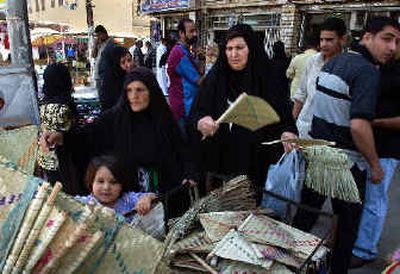Iraqis striving to find normalcy

BAGHDAD, Iraq – Women in strapless dresses and men in tuxedos were twirling to Kurdish folk music at a wedding party, while their children clapped hands in excitement, when a blast rattled the hall’s windows and the electricity flickered and died.
But the partygoers in this new Baghdad were not deterred. “Don’t they have a generator?” guests called, urging the drummer to keep playing.
Baghdadis have begun to insist on returning to good times – at least sometimes – in this edgy city where daily bloodshed has killed more than 620 people in the last month and made fear and stress part of the daily diet.
Three wedding parties on one day – one Christian, one Sunni, one Shiite – demonstrated the growing need for occasional normalcy amid the violence.
“I might die from one of those random rockets which might fall on my head while I am lying in bed,” said the bridegroom’s mother, Selma Munther, 49, a Christian Kurd. “We should go on and continue our lives, despite all we are going through.”
The bride, Zena Yousef, and bridegroom Yousef Jajjo arrived at Marhabah Hall, a private wedding hall in eastern Baghdad, arm in arm after their wedding in a church.
“I am very happy; words are not helping me,” said the bride, holding a bouquet of white roses.
Umm Zena, 40, the bride’s mother, called the occasion “unbelievable. In the middle of all the ongoing disastrous events, we can still feel happiness from the bottom of our hearts.”
Women came to the hall covered in long coats, but soon tossed them aside to show off party wear, including strapless dresses. Many had gotten their hair done and wore makeup and perfume.
Some men seemed astounded, staring as though trying to fill up their eyes with these uncommon sights.
Iraqi women cannot wear such dresses in public. In several cities, Islamic militants have publicly flogged and threatened unveiled women. Militants have accused them of being infidels and aligning themselves with the despised secularized culture of the United States.
Outside the hall, two security guards stood guard with machine guns.
The hall’s manager, Bassam Manuel, said his parties are not what they used to be in Saddam Hussein’s era, when the streets were more secure.
“Before the war, the parties used to start at 9 in the evening and end at 2 in the morning,” Manuel said. “Now the parties start at 3 in the afternoon and end at 8. Alcoholic drinks are forbidden – we don’t want any trouble.”
On top of that, he said, he’s had to double his prices. He charges about $6 for the cheapest dish: four pieces of shish kebab, a piece of bread, a soft drink and three kinds of appetizers.
All of this is still affordable for middle class families, who are starting to view a party, with its brief moments of carefree joy, as money well spent.
“I consider all these parties a divine sign that we will return to a prosperous Iraq,” said another bridegroom, Zaid Falih, 26, a Sunni Muslim banker who got married in a court the day before. Two explosions resounded nearby during his party, but Zaid ignored them.
Four guards with machine-guns stood at the front gate of the downtown club where Falih celebrated, and three other guards roamed the parking lot.